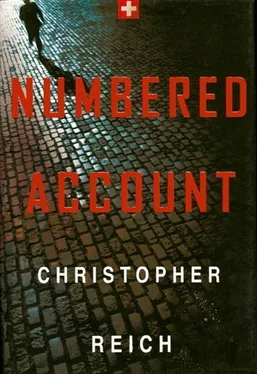“Calm down,” said Nick. He wondered if honesty and decency were resident members of the Swiss pantheon, or just visiting. “It certainly beats the alternative.”
“The alternative? What’s that? Self-immolation.”
“Federal legislation mandating cooperation. An act making our voluntary collaboration a matter of public record.”
Sprecher circled Nick’s desk like a predatory hawk. “Since 1933, we have managed to guard the integrity of our banks. Sixty-five years and now this. An abomination is what it is. A fucking disaster. Yesterday our bank’s position with regard to queries about a client’s identity and the activity in his account was unyielding. A brick wall. Without a formal federal warrant signed by the president, no information, not even the most inconsequential sliver, would be forwarded to an inquiring party. Not to General Ramos seeking restitution of the billions purloined by the Family Marcos, not to your Federal Bureau of Investigation looking to tamper with the working capital of a certain group of Colombian businessmen, and definitely not to a band of overzealous Zionists howling for the repatriation of funds deposited by their relatives prior to the Second World War.”
“It is exactly that intransigence that led to this situation,” argued Nick.
“Wrong,” shouted Sprecher. “It is that intransigence that built our reputation as the finest private bankers in the world.” He jabbed a finger in Nick’s direction. “And don’t you forget that. Granite, Neumann, not sandstone.”
Nick raised his hands above his head. He took no pleasure in defending Sterling Thorne’s point of view.
“Anyway, it’ll be your problem soon enough,” Sprecher said all too quietly. “I’ll be departing the premises in ten days.”
“Ten days? What about your quitting notice? You’re here at least until April 1.”
Sprecher shrugged. “Call it a divorce American style. I’m here until Wednesday next. Thursday and Friday, I’ll be taken ill. Nothing grave, thank you. Just a dizzy spell or a spot of flu. Feel free to take your pick if anyone should ask. Between you, me, and the fly on the wall, I’ll be at Konig’s place. Two-day seminar for new employees. I’m to start the following Monday.”
“Jesus Christ, Peter. Give me a break. The Indians are circling the fort and you’re tunneling out of here.”
“As I recall, the Alamo boasted a very low survival rate. Not a sound career move.”
Nick stood and looked Sprecher squarely in the eye. “And what if—”
“The Pasha? Won’t happen. I mean, how many clients does the bank have? And after all, according to you he’s just a successful international businessman with a crackerjack accounting department. Still, if ever such a situation did present itself, you’d be wise to consider the consequences before acting rashly.”
“Consequences?” Nick asked, as if he had never heard the word before.
“To the bank. To yourself.” Sprecher loped from the office. “I’m off to the tailor. New job, new suits. Back by eleven. You’re on duty this morning. If any new clients arrive, Hugo will phone from downstairs. Take good care of them.”
Nick waved good-bye distractedly.
* * *
Eight days later, Nicholas Neumann, only son of a slain Swiss banker, former marine lieutenant, unofficially promoted portfolio manager, and if his roster was correct, morning duty officer, arrived at his desk at five minutes past seven o’clock. The office was still dark, as were most of the offices on either side of the ambling corridor that cut a crooked swath through the center of the second floor. Closing his eyes, he flicked on the overhead lights. The intrusion of the fluorescent light never failed to bring back memories of a bad hangover. He walked to the employee pantry, where he hung up his damp overcoat, then laid a plastic bag carrying a freshly laundered dress shirt on top of the coat rack. The clean shirt was for that evening’s engagement: dinner with Sylvia Schon at Emilio’s Ristorante. Sprecher’s words about her plans for him had never really faded. He was looking forward to the dinner more than he cared to admit.
Nick made himself a cup of hot tea, then took a waxed paper sack out of his pocket: breakfast—a pain au chocolat fresh out of the oven from Sprungli. Cup in hand, he returned to his desk to study the Neue Zurcher Zeitung’s financial pages and check on the status of the stock markets in Tokyo, Hong Kong, and Singapore.
Once seated, he unlocked his desk and the credenza behind it. He opened his top right-hand drawer and took out his list of “action items,” which he updated twice a day. He read it.
“Item one: Review portfolios 222.000-230.999 for bonds that were due to expire before month’s end. Item two: Order printouts for accounts 231.000-239.999. Item three: Review preferred equities sheet [a list of stocks portfolio managers were allowed to purchase for the accounts of their discretionary clients]. Highlight companies seen as likely takeover candidates.” Item four said simply “15:00.”
He stared at the time indicated and wondered why he had written anything at all. Why not: “Item four: Make sure your ass is in your seat at three o’clock when the Pasha calls.” Or “Item four: Don’t screw the pooch the first day your superior is absent.” As if he even needed an “Item four” to remind him!
Nick opened the newspaper to the financial section and checked the daily market commentary. The Swiss Market Index had risen seventeen points to 4975.43. USB shares were up five francs to 338 on heavy buying—Klaus Konig stocking up his war chest in advance of the general assembly to be held in four weeks’ time. Nick decided to check on the stock’s daily volume since Konig’s announcement.
He slid his identification card into Cerberus’s access slot and waited for the computer to power up. A stream of yellow words passed along the left side of the screen as Cerberus ran its self-diagnostics. Moments later a brusque voice said “Wilkommen,” and the screen blossomed into a dull shade of gray. Nick entered his three-digit identification code, and a rectangular box descended through the center of the screen. Four choices were offered him: Financial Market Information, Reuters News, USB Account Access, and Document Manager. He moved the cursor to Financial Market Information and hit enter. The screen blinked, then turned a lustrous blue. The same rectangular box appeared. New choices: Domestic or International. He chose domestic, and a yellow ribbon appeared at the bottom of the screen flashing yesterday’s closing prices at the Zurich stock exchange. He typed in the symbol for USB, added a “.Z” to indicate the Zurich exchange (prices of major Swiss stocks were also quoted by the Geneva and Basel exchange), and followed it by the coded instructions VV21. A daily summary of USB share price and volume traded for the past thirty days appeared on the screen. Graphical interpretations of the data were shown on the right side of the screen.
The price of USB shares was up eighteen percent since Konig’s announcement. Daily volume nearly double. The stock was definitely in play. Traders, brokers, arbitrageurs eager for a little action on the habitually calm Swiss market, had seized upon the United Swiss Bank as an interesting “story,” that is, a possible takeover candidate. Still, an increase of eighteen percent in the share price was small, given the higher daily volume, and reflected the unlikelihood of Konig’s actually making good on his promise. Then why the rise? A certainty that USB would act decisively to improve its lagging return on assets, and thus profitability, be it through cost cutting or more aggressive trading.
Nick moved to the “Reuters News” section and tapped in USB’s symbol to see if any stories had been floated the night before about Konig’s foray. The screen blinked. Before he could read the first words, a firm hand was placed on his shoulder. He jolted upright in his chair.
Читать дальше












